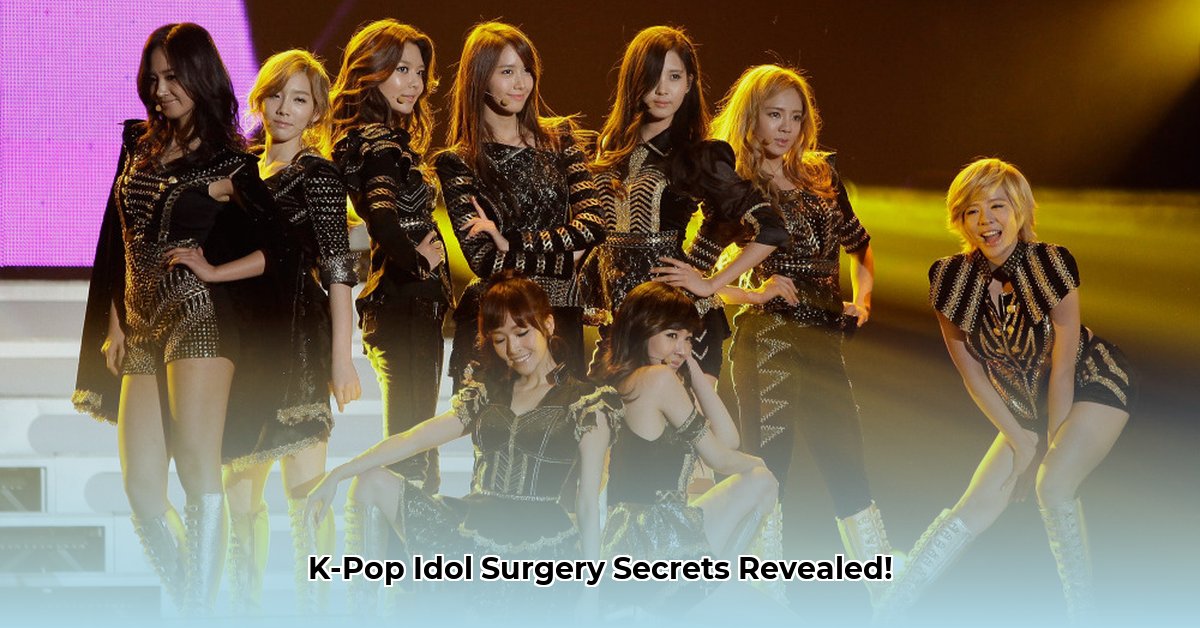Ever been captivated by the seemingly flawless appearances of K-Pop idols? Beneath the surface of radiant smiles and picture-perfect features lies a complex world of cosmetic procedures. This article delves into the intricate choices these stars make, examining the reasons behind their decisions, the common procedures they undergo, and the broader implications for the K-Pop industry and its global fanbase. For more insights into this topic, see this [in-depth analysis](https://braghq.com/kpop-and-plastic-surgery). Prepare to explore not just makeovers, but the pressures, beauty standards, and personal journeys that shape the faces of K-Pop.
The K-Pop Transformation: Decoding the Beauty Standards
The K-Pop industry is synonymous with dazzling visuals, but the path to achieving these captivating looks often involves cosmetic enhancements. This exploration isn’t about passing judgment, but rather understanding the multifaceted world of K-Pop plastic surgery: the pressures, motivations, and the far-reaching impact on both idols and fans.
Delving into the procedures themselves, some of the most sought-after include:
-
Double Eyelid Surgery (Blepharoplasty): Designed to create a more open and defined eye appearance, making the eyes appear larger and more Westernized.
-
Rhinoplasty (Nose Reshaping): Aiming to refine the nose’s shape, size, and overall appearance, often striving for a more delicate and harmonious profile.
-
V-Line Surgery (Jaw Contouring): Reshaping the jawline to achieve a more defined, slim, and V-shaped facial structure, a popular beauty ideal in South Korea.
These procedures aren’t just about achieving a generic standard of “beauty,” but aligning with specific and deeply ingrained beauty standards within Korean culture and the K-Pop industry. The pursuit of these facial structures isn’t merely tolerated, but often celebrated as a pathway to success. These procedures reflect an ideal that is heavily influenced by Korean beauty ideals that place a strong emphasis on youthfulness, clear skin, and delicate features.
The reasons behind these choices are rarely simple. The intense pressure to conform to a specific ideal is a major driving force. The K-Pop industry places immense value on visual appeal. Agencies, in their pursuit of maximizing their idols’ commercial potential, may subtlety encourage, or even require, these procedures. This creates a challenging dilemma for idols, caught between their personal desires and the significant career implications tied to their appearance. While some idols openly share their experiences, many choose to remain silent, leading to speculation and shrouding the topic in mystery.
This leads to a critical discussion about authenticity. Does altering one’s appearance diminish genuineness? Some argue that cosmetic surgery is a personal choice, a means of enhancing features that may cause self-consciousness. Others express concern that the emphasis on surgically enhanced perfection perpetuates unrealistic beauty standards, impacting not only idols but also their millions of fans worldwide. Is this relentless pursuit of the “perfect” face truly healthy? This debate requires careful consideration of the multiple perspectives involved. The global popularity of K-Pop means these beauty standards extend worldwide, leading to international interest in similar procedures, thus highlighting the global influence K-Pop holds in the beauty industry.
It’s vital to acknowledge that each idol’s journey is unique. Some may undergo procedures to address personal insecurities, boosting their confidence. Others might feel pressured by their agencies, facing a difficult choice between their career and personal comfort. The reasons are a complex combination of personal feelings, industry pressures, and cultural expectations.
Looking forward, a more balanced approach is crucial. Open conversations about the pressures within the industry are long overdue. Prioritizing idols’ mental and emotional well-being must become a central for agencies. The focus should shift towards celebrating diverse beauty, moving away from restrictive and unrealistic expectations. This requires collective responsibility from agencies, media outlets, and fans. The future success of the industry will rely on honest and responsible dialogue. The impact extends far beyond Korea; it’s crucial to consider the ethical implications of K-Pop’s impact on global perceptions of beauty and self-esteem.
The ongoing discussion about K-Pop surgery emphasizes the critical role media plays in shaping beauty standards and the pressure faced by individuals in the public eye. Further research is needed to better understand the long-term effects of these trends, both on idols and their fans.
Building Transparency and Evolving K-Pop Beauty Standards
| Stakeholder | Current Status | Desired Evolution |
|---|---|---|
| K-Pop Idols | Varying levels of openness regarding cosmetic procedures, often influenced by personal comfort and agency guidance. | Promote open and honest communication about procedures, reducing the stigma and encouraging a more supportive environment for personal choices. |
| Agencies | Often exert pressure, explicit or implicit, to conform to prevailing beauty ideals to enhance marketability. | Prioritize the mental health and overall well-being of idols above purely aesthetic considerations, fostering a culture of self-acceptance and diversity. |
| Fans | Frequently admire and emulate idols’ appearances, sometimes leading to unrealistic self-expectations. | Encourage a more critical understanding of media influence on beauty standards, celebrating individuality, and promoting positive body image. |
| Media & Entertainment | Potential for sensationalism and biased reporting on idols’ appearances, perpetuating narrow beauty ideals. | Promote responsible and balanced reporting, highlighting diverse beauty standards and realities within the industry, minimizing the focus on purely physical attributes. |
The story of K-Pop cosmetic surgery is one of continuing transformation, involving complex interplay of pressure, individual choices, and global impact. It’s a conversation that will continue to evolve as both the industry and societal views adapt and become more accepting of multifaceted ideals.
The Psychological Landscape: How K-Pop Idols Navigate Plastic Surgery Pressures
The dazzling stage of K-Pop often obscures a stark reality: the immense pressure to conform to rigid beauty standards. This frequently leads to cosmetic procedures, leaving many idols grappling with significant psychological challenges. How do idols navigate this complex environment?
The Double-Edged Scalpel: Trading Identity for Image
With South Korea at the forefront of the global cosmetic surgery industry, it’s no surprise that the K-Pop industry places such a premium on youthful, idealized features. The pressure to fit a specific mold is especially intense for aspiring idols. Cosmetic surgery, for many, becomes a carefully considered risk – a pathway to boosting their career, but one laden with emotional and psychological costs.
Imagine it as an intricate balancing act. On one side lies the allure of fame and fortune, fueled by a visually-driven industry. On the other, the weight of potential psychological distress, constant scrutiny, and the ever-present fear of falling short of expectations.
Behind the Mask: Mental Health and the Emotional Toll
How do K-Pop idols manage the psychological impact of plastic surgery pressure? There is no single answer. The coping mechanisms are diverse and often deeply personal. Some idols find support in their agencies, gaining access to mental health resources and counseling services. Others rely on their families and close friends for emotional support and guidance. Many endure the pressure privately, silently grappling with the emotional aftermath. This culture of silence compounds the problem, creating a self-perpetuating cycle. The lack of open discussions regarding surgical enhancements further exacerbates the issue. Constant judgment and online speculation amplify anxieties: is fame worth the cost to one’s well-being?
Navigating Expectations: Strategies for Resilience
While some K-Pop agencies are beginning to prioritize mental wellness, there is a long way to go. Many idols find solace and emotional release through creative outlets, channeling their energy into music, dance, writing, and other artistic pursuits. Others develop strong support networks among fellow idols, creating a sense of community and shared understanding. Are these support systems sustainable in the face of continued pressure?
It’s essential to recognize that every idol’s experience is unique. Some openly discuss their procedures, challenging societal norms and fostering transparency. Others prefer to keep their journeys private, protecting their personal space and emotional vulnerability. Both choices deserve respect, as the psychological impact of plastic surgery pressure varies significantly.
The Wider Ripple Effect: Fans and Societal Impact
The effects of this pressure extend beyond the idols themselves. Fans are often caught in the crossfire, grappling with their own perceptions of beauty and self-worth. The pressure to conform to unrealistic ideals can negatively impact body image and mental well-being. The media’s role in perpetuating these ideals is also critical. The pursuit of the perfect “K-Pop look” isn’t simply about aesthetics; it’s about power, control, and the relentless quest for an unattainable standard. Meaningful discussions require a multi-faceted approach, recognizing the interplay between industry pressure, societal expectations, and individual choice.
Pathways Forward: Striving for Balance and Authenticity
The K-Pop industry is showing signs of positive change. There’s a growing emphasis on mental health and well-being. Agencies are acknowledging the immense pressure their idols face. However, more needs to be done. Open dialogue, comprehensive mental health support, and a broader questioning of unrealistic beauty standards are essential components of a more sustainable and healthy future for the industry.
Key Takeaways:
- The K-Pop industry’s intense focus on specific beauty traits fuels the demand for cosmetic surgery, contributing to a multi-billion dollar industry.
- The pressure to conform to these ideals significantly impacts the psychological well-being of idols.
- Coping mechanisms range from agency-provided mental health resources to personal support systems.
- This pressure extends to fans, impacting their own perceptions of beauty and self-worth.
*
- Discover Affordable Singing Lessons Near Me to Unlock Your Potential - February 24, 2026
- Affordable Vocal Lessons Bring Professional Singing Guidance Within Reach - February 23, 2026
- Local Vocal Lessons Offer Expert Guidance for Every Singer - February 22, 2026










